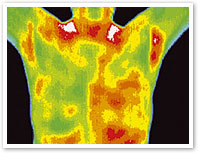Thermography

Most individuals have probably heard of thermography. It’s been around for a while and is quite often associated with things other than clinical medicine. For example, firefighters might use thermography to see through smoke to find people trapped in a fire or engineers may use this technology to spot things like faulty power lines or leaky insulation.
However, thermography - which can record the heat produced by different parts of the body - is often used to study blood flow and to detect tumors. Lately, the technique has also made its way into the realm of alternative medicine. More and more, practitioners are using thermography to detect problems within the body and to keep an eye on the healing process.
The image map produced by the thermograph shows abnormal hot or cold areas, which can be indicative of a number of different diseases. While, the U.S. Food and Drug Administration has not approved the use of thermography for screening for diseases, there is evidence to suggest it may be helpful in the future for diagnostic procedures involving breast cancer, vessel diseases of the head and neck (extra-cranial), neuro-musculo-skeletal disorders, and vascular disease of the lower extremities.
Most importantly, note proponents of alternative medicine, thermography is non-invasive and non-radiative, making it far safer than the standard x-ray and while it is not currently an approved diagnosis technique there is hope that one day it may become an alternative diagnostic procedure for those with a variety of diseases wishing to limit their radiation exposure.
Cancer’s Connection to Thermography
While thermography is now used extensively to detect breast cancer and measure metastases, those who tout the use of this diagnostic procedure also note that this type of thermal imaging can spot certain types of cancerous masses long before more conventional imaging techniques, including mesothelioma disease.
Hopes are that, in the future, this form of digital imaging may be able to help detect cancer at early stages, including difficult-to-diagnosis types of cancer like mesothelioma, which remains latent in the body for decades and is usually not able to be diagnosed until it reaches Stage 3 or 4 and is, at that point, difficult to manage.
This kind of medical imaging can also display pain by detecting any changes in skin surface temperature that can accompany pain states, note those who practice regular use of thermography. Hence, alternative medicine practitioners are better able to access the amount of pain a cancer patient is experiencing and may also be better able to address specific pain via complementary therapies including massage, touch therapy, energy field therapy, or other common complementary techniques.
Thermography Directory
For your convenience, we have assembled a directory of Thermography resources in your geographic area. Please enter your city and state, or 5-digit postal code into the field below to learn about resource available near you.
Sources
Orange County HealthCare
http://www.ochealthcare.com/alternativemedicine.htm
Foundation for Alternative and Integrative Medicine
http://www.faim.org/guestwriters/donnatomeythermography.html
If you have questions about Thermography or your legal rights please contact us.
Free Mesothelioma Information Packet
Enter your information to receive a comprehensive mesothelioma packet free of charge at your doorstep within 24 hours.


